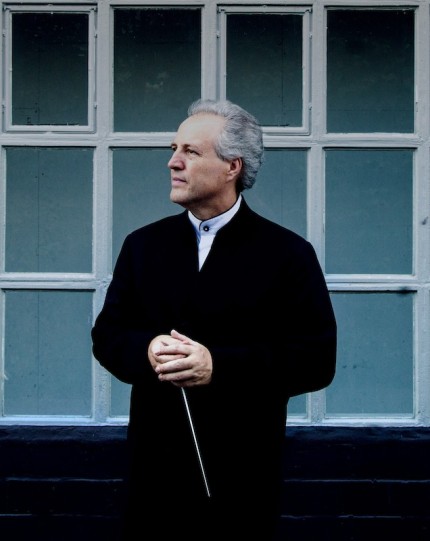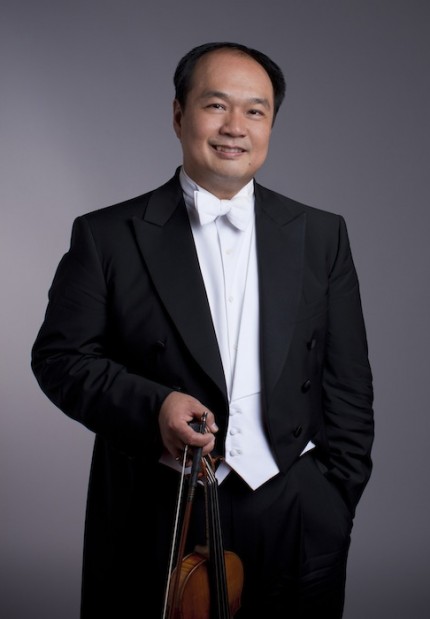Honeck and CSO deliver an explosive Tchaikovsky Sixth

Chicago Symphony Orchestra musicians and audiences alike were no doubt disappointed by Riccardo Muti’s cancellation of this month’s concerts due to the music director’s convalescing from hip surgery.
Still, the weekly podium vacancies have been admirably filled by the orchestra–first by Gennady Rozhdestvensky and this week by Manfred Honeck who led the CSO Thursday night.
Losing the opportunity to hear a rarity like the scheduled Symphony No. 3 by Alfredo Casella was regrettable. But there was ample compensation in the roiling performance of Tchaikovsky’s Symphony No. 6, which further burnished Honeck’s local street cred as one of the CSO’s most reliable and exciting guest conductors.
As with his memorable Beethoven Seventh in his last CSO dates in 2014, the Austrian conductor has a unique ability to infuse even the most familiar scores with uncommon freshness and electricity. Honeck’s open rehearsal of the Tchaikovsky symphony Thursday morning was illuminating. He was unfailingly cordial yet highly efficient, zeroing in on small yet telling details usually glossed over that can make a big impact in performance.
And from the dark and lugubrious opening bassoon solo–wonderfully played by Keith Buncke–everything in the Tchaikovsky performance seemed to resonate with an extra degree of tangible presence and dramatic weight Thursday night. The celebrated secondary theme of the opening movement was refined in its initial string statement, growing to a rich, ardent outpouring of emotion. The sudden eruption in the development was scary in its unhinged explosive power with the frantic desperation of the ensuing section riveting under Honeck’s kinetic direction. The woody timbre of Stephen Williamson’s clarinet solo lent the right note of brief solace to the coda.
The waltz-like second movement was taken at a brisker pace than usual, losing some contrast and affection perhaps, but the more restless expression suited the nervy undercurrent of this performance. As one might expect from this partnership, the third movement march was virtuosic and exhilarating. The playing had a hair-trigger excitement throughout, especially the galvanic yet polished string playing.
But for once the downbeat finale really did emerge as the climax of the performance. The orchestral statements were genuinely tragic, anguished outbursts rather than just melancholy lamenting. The clarity of the dirge-like trombones made the somber death knell manifest with the basses’ long slow fade beautifully played and directed. Honeck held the silence with a quiet authority that let the dark coda resonate for a good two minutes. That didn’t feel a bit too long; indeed, the force and expressive power of this performance seemed to require it.
The first half of Muti’s original program was intact, devoted to Ottorino Respighi, in what might be termed the CSO music director’s continuing series, Not-So-Great Music by Italian Composers.
The CSO gave the U.S. premiere of Respighi’s Concerto gregoriano in 1924 just two years after its world premiere in Rome. The last CSO performance was a half century ago, led by Jean Martinon with Victor Aitay as soloist, and it was another CSO concertmaster, Robert Chen, who was stage center in Respighi’s violin concerto Thursday night.
As indicted in the title, the composer stated that he drew upon Gregorian themes in this concerto for the first time, an influence found in many of Respighi’s later works. The Gregorian flavoring is more subtle than prominent though, and perhaps felt most in the lyrical theme of the slow movement.
Stylistically the concerto is richly melodic, though more lyrical than overtly virtuosic, and far flung in its elements. The virile, striding theme of the finale sounds uncannily like a pre-echo of Hollywood western film scores.
But the most striking inspiration seems to come not from Gregorian chant but from more recent musical developments northwest of Rome. It’s hard to avoid the fact that the pastoral solo violin writing sounds like Ralph Vaughan Williams with an Italian accent. Respighi claimed he never heard the English composer’s The Lark Ascending, which was premiered just a year before Respighi completed his concerto. But with some sections of the wistful violin line that come close to outright cribbing from Vaughan Williams’ violin concertante work–especially in the final movement–that’s pretty hard to believe. Maybe Respighi should have called his concerto The Italian Sparrow Ascending.
Robert Chen’s slender, silvery timbre and intimate expression proved well suited to this rhapsodic music, and the CSO concertmaster played with pure tone and unfailing sensitivity. One would have liked a bit more fire and intensity in the final movement’s bravura sections where the solo playing felt too laid back, especially next to the unbridled energy and cinematic sweep of Honeck’s hard-charging accompaniment.
Respighi’s The Fountains of Rome (1924) opened the evening. The first of the composer’s triptych of Italian musical postcards is less bombastic and kitschy than the souped-up showpieces that followed.
There was no shortage of sonic heft in the brilliant sections, as with the brassy opening to the Triton Fountain. The Trevi Fountain music built to a seismic tutti that made the spraying jets seem more like the tidal wave that capsized the Poseidon.
Yet it was the more restrained outer movements that were most striking, with Honeck eliciting finely calibrated dynamics in the gently glowing coda of the Villa Medici Fountain finale. There were wonderfully evocative contributions from clarinetist Williamson, guest flutist Christina Smith, and, especially, guest oboist Frank Rosenwein.
Principal oboe of the Cleveland Orchestra, Rosenwein played with beautiful tone, delicate coloring, and expressive distinction throughout the evening. He floated the opening theme of the Respighi concerto gloriously and blended fluently with the CSO winds as if a veteran member of the ensemble.
Is it too much to hope that Rosenwein can be lured to Chicago? There was significant buzz among audience members Thursday night (“Who is that guy?”) and a feeling of excitement–and perhaps relief–that the CSO may have found its next principal oboe.
The program will be repeated 8 p.m. Saturday. cso.org; 312-294-3000.
Posted in Performances






Posted Feb 20, 2016 at 8:34 am by Tod Verklärung
Well said. Friday afternoon’s performance was much the same. One addition: the Tchaikovsky 6th was the third rendition in as many years (Dohnanyi/2014, Muti/2015). Perhaps the continuing series you describe should be called “Not-So-Great Music by Italian Composers and Great Non-Italian Music We Played Last Year.”
Posted Feb 21, 2016 at 10:11 am by Spencer
With short notice and a concerto Honeck never or rarely has led, the closer had to be a frequent feature on cso programs, whether 3 in 3 years or any other arithmetic combo so there is need to complain about that. Also, the concerto was certainly interesting and enjoyable enough to warrant its inclusion as a different kind of concerto from the bravura norm so the “not so great” monicker seems to indicate only warhorses should be performed, which of course this column complains about all the time!
Posted Feb 26, 2016 at 1:10 pm by Matthias
Spencer, I agree with you that it’s pointless to complain about both ultra-predictable programming and inferior quality of anything other than warhorses. However, I believe you underestimate both the CSO musicians and this conductor tremendously by suggesting that they had no other option than to pull out Tchaikovsky 6 *again*.